
|
With the rise of smartphones and social media, symbols have become a regular part of modern communications. It’s unsurprising that emoji usage has spilled over into the workplace, but inappropriate symbols or misinterpretations of emojis can cause issues. And according to survey respondents, some emojis (e.g. eggplant, peach, & middle finger) are never ever appropriate in any professional situation.
Slang is another major question mark when it comes to the best way to professionally communicate at work. There are many words and phrases that might seem suitable for casual conversation with friends but not for interactions with co-workers and supervisors. For example, slang terms like "lit" or "dope" might indicate a lack of professionalism when used between an employee and a boss.
We explored this topic by performing a survey of more than 1,000 employees and supervisors and asking them about their emoji and slang use in the office.
We interviewed a large group of workplace employees and managers about the validity of using slang and emojis in the workplace. Older generations prefer more professional language, but what may surprise you is that managers are more likely to use casual communications.
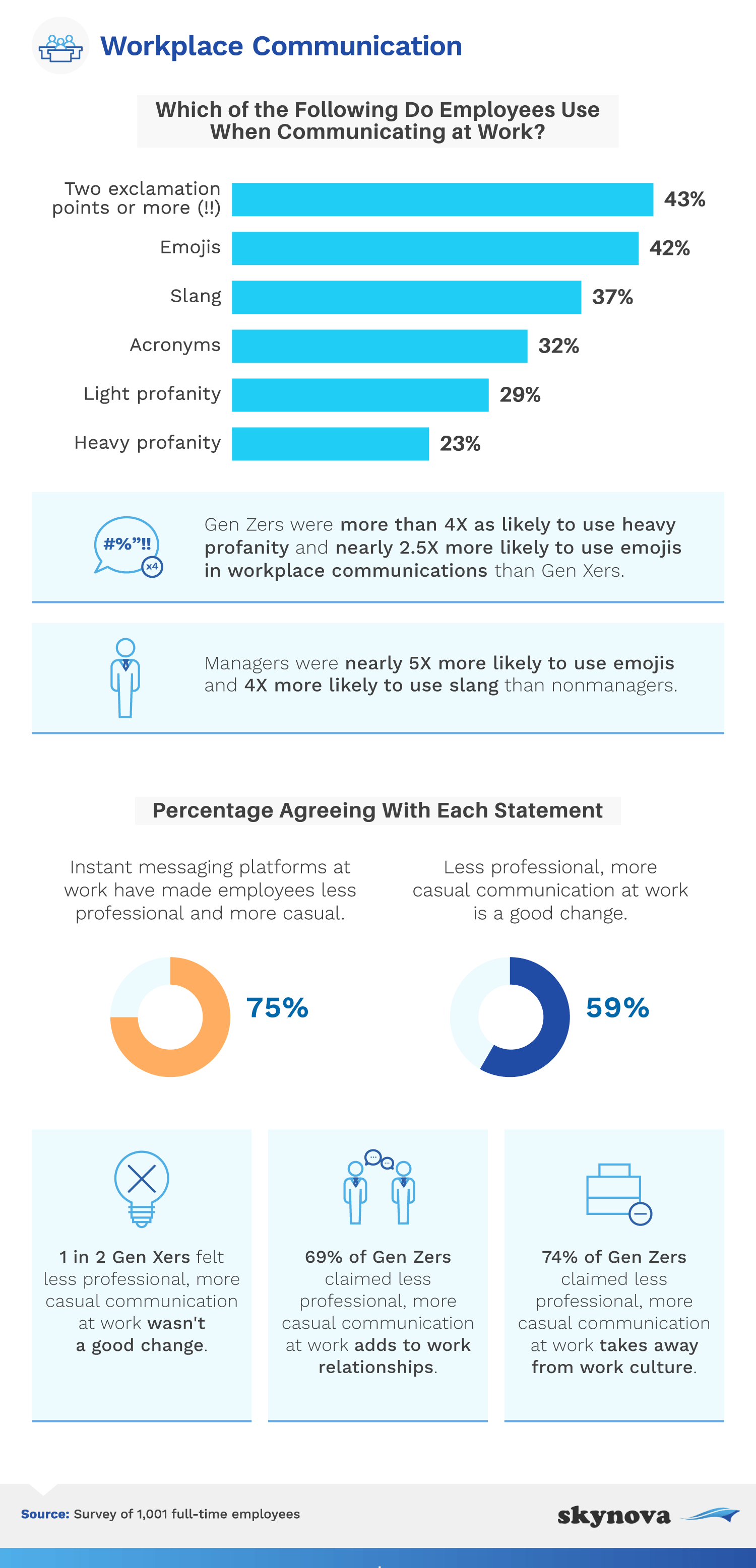
The prevalence of using two concurrent exclamation points, as well as emojis, should not be understated. According to the data, Gen Zers were more likely than their older counterparts to use casual punctuation, emojis and slang.
Instant messaging apps (e.g. Slack and Google Meet) have made communication at work seamless. 75% of employees believe instant messaging apps have caused workplace communications to become much more casual. Gen Zers saw a benefit to this phenomenon; 69% felt that more casual conversations benefit work relationships in the long run.
We next surveyed employees on the emojis they use. With differing opinions on usage of emojis, it’s clear that the official stance on them in a workplace setting isn’t fully established. But responders had opinions on which emojis were most inappropriate.
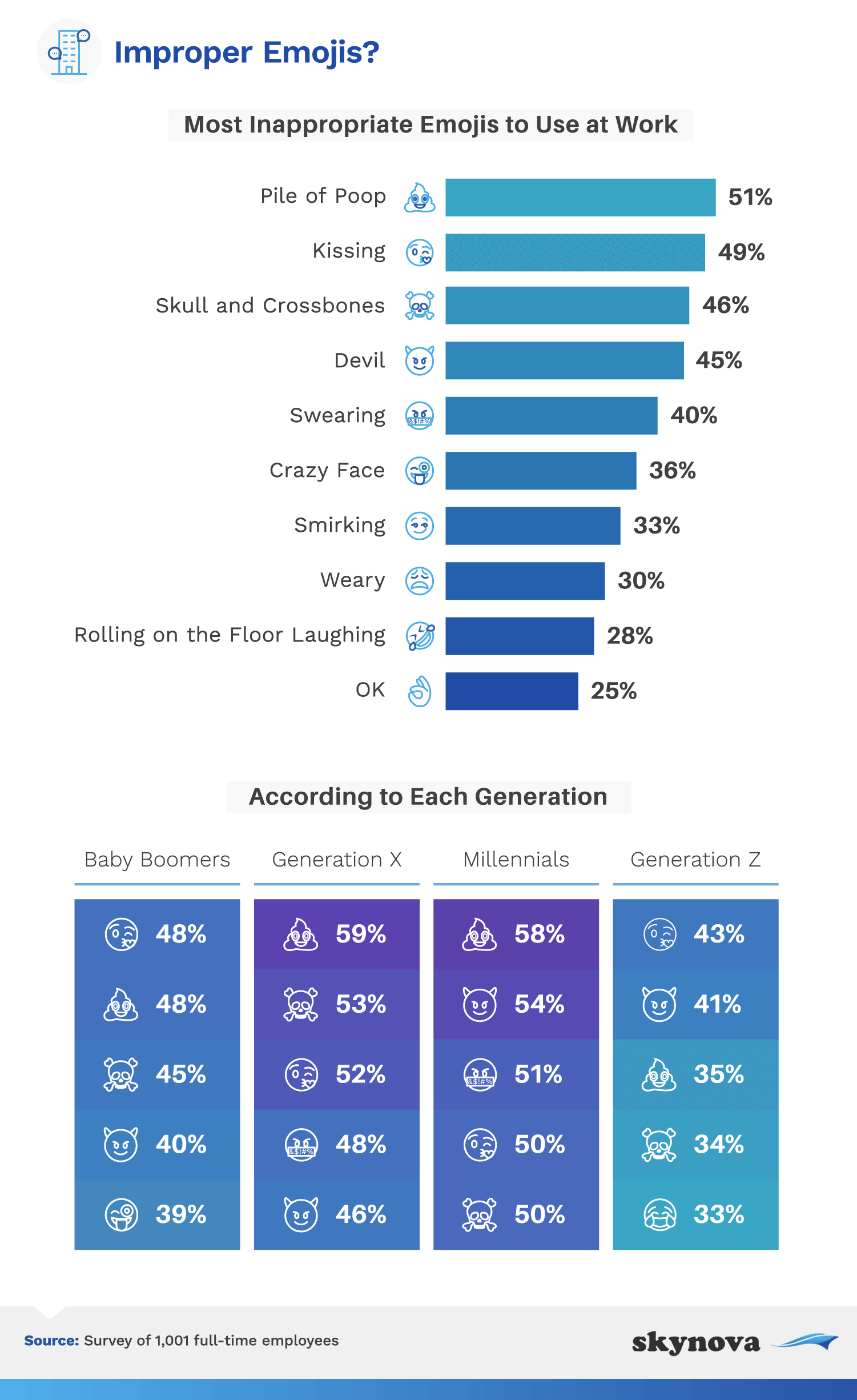
While slightly contradictory, analysis of the data reveals how many view certain emojis as acceptable and also illuminates the portion who disagree. The advent of the "poop" emoji left many in disagreement, though it was cited as the most inappropriate workplace emoji overall. Still, Gen X (59%), millennials (58%), and baby boomers (48%) deemed this emoji unacceptable at a considerably higher rate than Gen Zers (35%). Other emojis making the top 5 most inappropriate list for all generations included the "winking face blowing a kiss," "the smiling face with horns," and the "skull and crossbones."
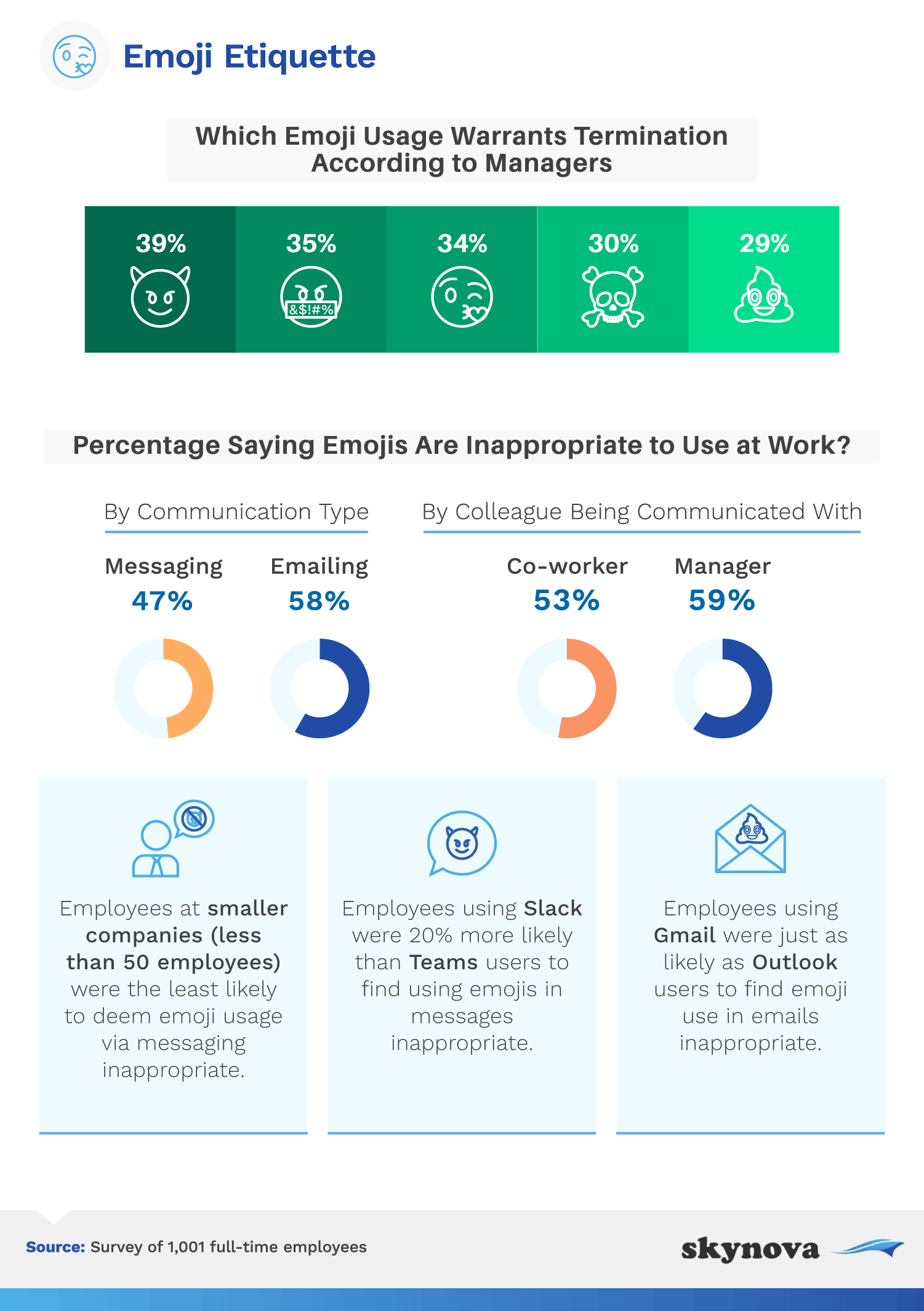
Continuing to look at the data, we noticed further changes in what is traditionally viewed as acceptable in the workplace. Emailing came out on top for what would be the most inappropriate medium of communication for emoji usage. Managers also agreed that the "smiling face with horns" emoji was the most inappropriate and the most warranting of employee termination. The size of the company also came into play, with emoji users at small companies finding it more appropriate to use emojis in messages than other employed individuals.
While it’s clear to see that there is still some disagreement about what’s acceptable in the workplace, managers have taken a pretty clear stand on which emoji use could constitute a fireable offense.
It’s noticeable that the type of emoji, or in this case slang, can determine the level of acceptability in the workplace. We looked at the type of slang being used as to its appropriateness and how employees viewed such a method of communication.
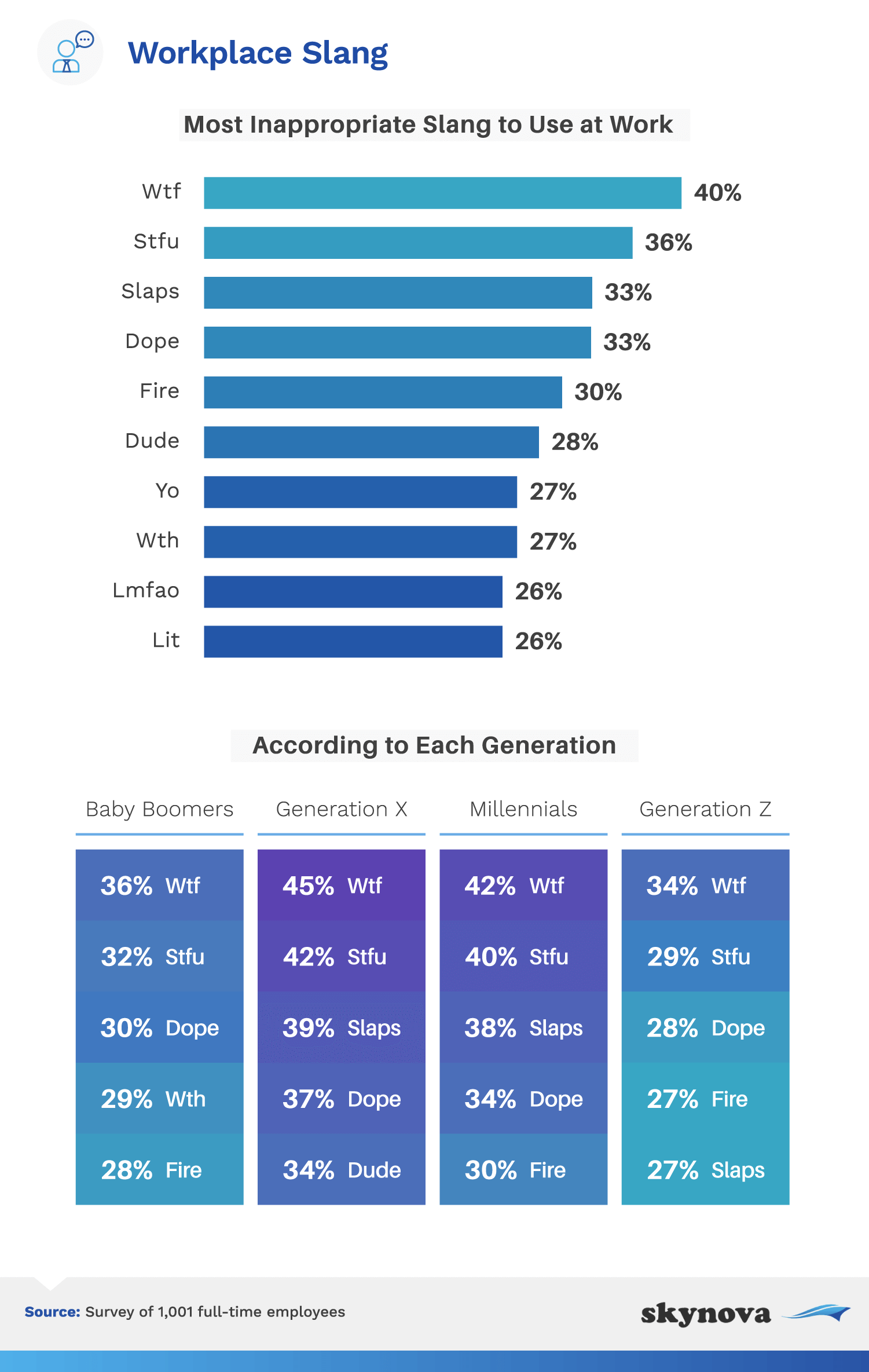
It appears that Gen X was the most sensitive to inappropriate slang—their reactions garnered the most disapproval of a variety of words and terms. Gen Z disapproved the least of the cohorts but agreed with other generations that "Wtf" and "Stfu" were the most inappropriate uses of slang in the workplace.
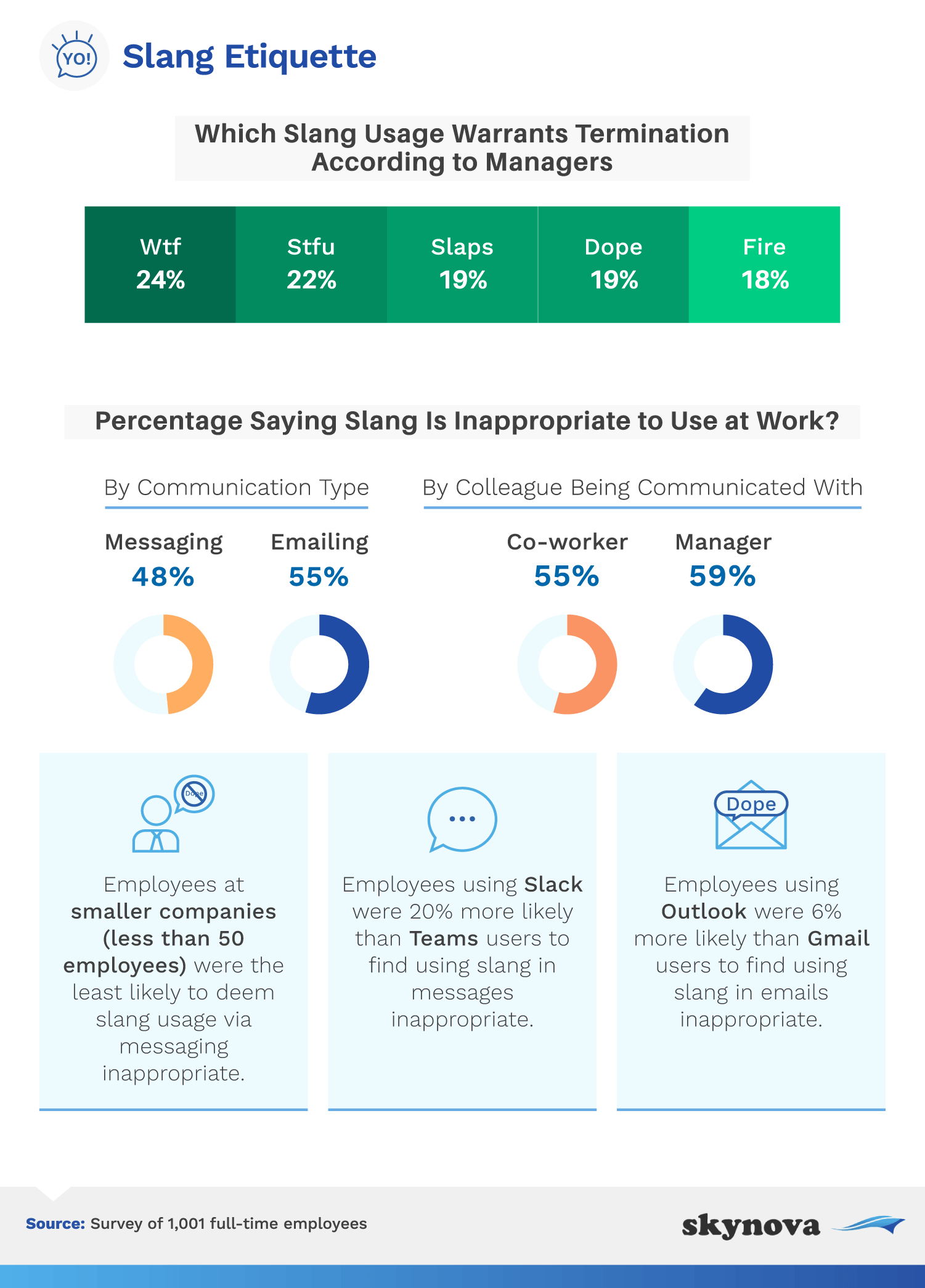
Agreeing with employees, managers also viewed "Wtf" as the worst sin of the office in terms of slang usage — it was deemed the term most worthy of severing ties with an employee. Closely followed by "Stfu" and "Slaps," perhaps the context of when such slang is used is important to understanding managers’ strong disdain. When asked which communication method is most inappropriate for slang use, similar percentages chose email (55%) as did messaging (48%).
Smaller companies continued to take the charge, as they often didn’t see slang use in workplace messaging as inappropriate. Dissecting that fact, it may be that smaller companies are more close-knit and may not feel like ‘professionalism’ is as much a mandate.
We may not think about our email signatures often. They come as second nature and have long stood in our inboxes and email settings. This part of the survey looks at the kind of signatures people considered the most unprofessional.
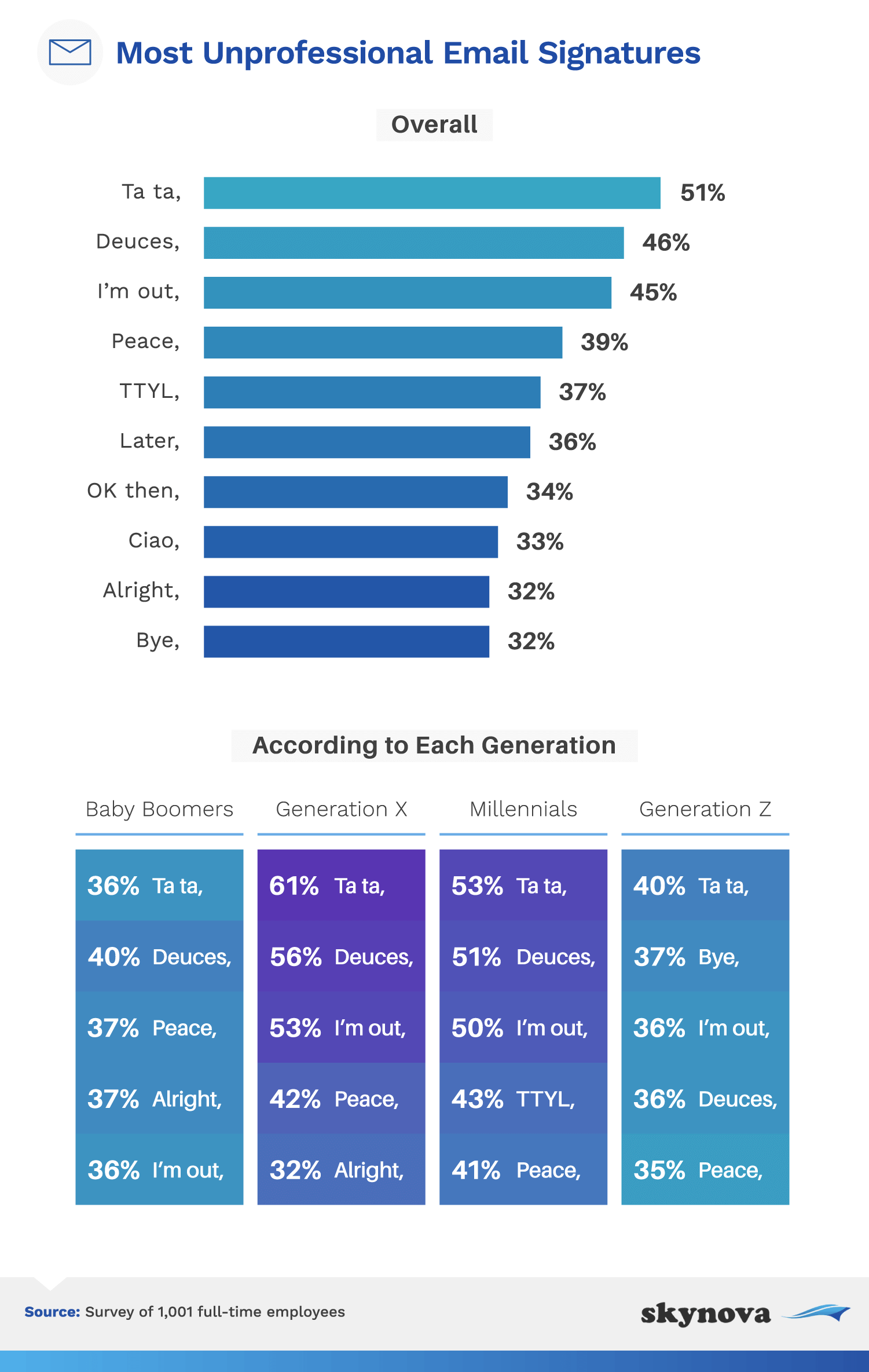
Most agreed "Ta Ta" to show the worst kind of unprofessionalism in an email signature. You may wonder why, as it’s traditionally known as a British phrase, but it is not used as often in the U.S. That phrase is quickly followed by curt signoffs such as "Bye" and "Deuces." It seems many people focus on what kind of salutation is given and even its apparent meaning, much as we are in this survey. And again, Gen X was most likely to dislike casual communications.
Looking at this survey, it's easy to see how well-intentioned employees and managers can get lost in the weeds based on certain vernacular. We will have to be aware of generational differences in order to understand the implications of our choice of language. Additionally, while managers are more casual with communications, the majority of older employees avoid being overly casual, preferring a more respectful stance. And certain phrases and emojis are considered unprofessional by managers and employees alike.
Skynova is an invoicing and small-business solution center for all payroll-related needs. Serving its customer base for years, Skynova is committed to providing excellent services for small business owners.
Skynova surveyed 1,001 full-time employees about workplace communication. 20% of respondents were Baby Boomers, 27% were Gen Xers, 28% were Millennials, and 25% were Gen Zers. The margin of error for this study’s sample at a 95% confidence level is 3%. Survey data has certain limitations related to self-reporting.
Interested in sharing our data regarding emojis in the workplace? Anyone with this link or content can share it for noncommercial purposes, with the condition that a link is placed to refer to its original owner and developer.